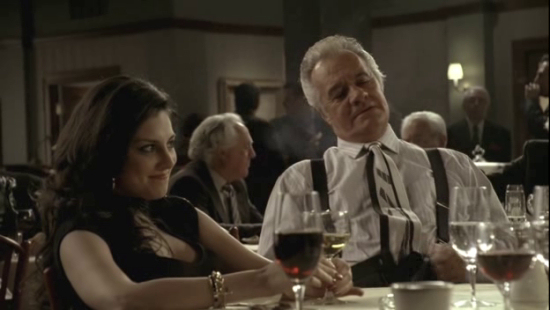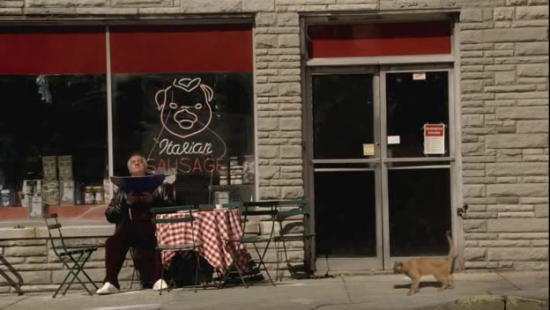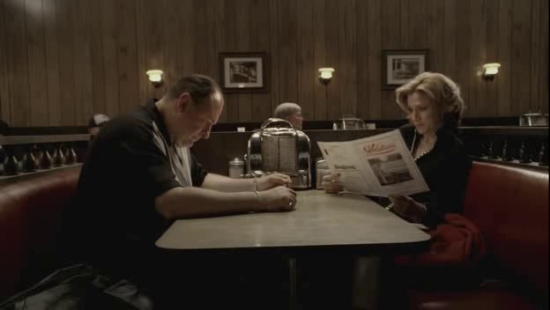
I had a dream last night about what happens
after the infamous cut to black in the series finale of The
Sopranos. I dreamt Tony gets shot by the suspicious guy in the
member's only jacket in the diner but then time reverses and starts again
before Tony's shot. Paulie comes in and shoots the guy before he can get Tony.
We then learn that earlier Tony had taught Paulie the technique for reversing
time through mental concentration. I think maybe the scene where the two of
them were talking about their superstitions--and Paulie's fear of cats--earlier
in the episode led up to it.

After Paulie saves Tony and his family they
go to a small, out of the way apartment complex to hole up. Leaving the
Sopranos in one room, Paulie goes to another room where a couple guys are
staying who each owe him 445 dollars exactly. "Where's the money?" he
asks. The guys point to a shelf by the door where Paulie finds a wallet
containing two 445 dollar bills. "I didn't know they made 445 dollar
bills," says Paulie, incredulous.
The two guys, in their twenties, are
playing cards and one of them says offhand and irritated, "They make any
kind of bill you want at the bank. You just ask them."
"Yeah?" says Paulie now sounding
slightly curious and impressed. "You mean if I go in and ask for an eleven
dollar bill they'll make me an eleven dollar bill?"
"Yeah, Paulie."
"Holy shit." He takes the bills,
goes outside to meet with the 8 year old daughter of one of the soldiers for
the Soprano family and they get in Paulie's car. As they're pulling out into
traffic they get in a minor car accident when a slow moving car hits the side
of Paulie's car. Paulie gets out to talk to the guy but his vanity isn't
satisfied with how he handles it so he reverses time back to before he collects
the 445 dollar bills. The sequence begins to play out over and over again as
Paulie vainly tries to enact the events in a way that impresses himself.
Sometimes he and the little girl ride a bicycle instead of a car but the
accident never seriously injures them.

So yes, last night I finally finished
The Sopranos, a show I started watching in July 2012.
Finishing The Sopranos almost took me as long as finishing
Doctor Who--The Sopranos comprised of 86
episodes and Doctor Who being 800 (slightly less than that
when I was catching up with the show). I went through the first five seasons
fast enough on The Sopranos but the final season just seemed
completely limp most of the time. Tony in his coma dream world at the beginning
of the season was a tangent that went nowhere, essentially just an opportunity
for Gandolfini to show he could play another character. After that, the show
just seemed to tread water. The story about a gay member of Tony's crew was
kind of interesting but things didn't really pick up until the last few
episodes when main characters started being killed off.
The
Wikipedia entry for the final episode summarises a number of fan
theories and includes statements from series creator David Chase regarding the
ambiguous ending. Although it doesn't really make sense since Tony had made peace
with the New York
family, I'm inclined to be with the camp that says the cut to black was Tony
being killed. I think it's ironic Journey's "Don't Stop Believin'"
became so popular in the wake of the episode because I think the song was used
specifically for its vapidity. To reflect the lie of Tony's conception of his
life as working and stable.
I think the reason Chase left the ending
open to interpretation was that neither possibility interested him--Tony
getting killed feels like a trite moral, Tony's mostly happy lifestyle
continuing as it has seems unrealistic. There's plenty of trouble foreshadowed
in the episode--Carlo testifying to a grand jury, Uncle Junior's pathetic end
in a state nursing home despite having run New Jersey with Tony's father. But
considering legal troubles and mental health troubles have been problems Tony
has faced and essentially overcome throughout the series, suggesting they might
be issues again in the future hardly says anything conclusive.
There's a message that emerges incidentally
in The Sopranos that I don't think Chase was comfortable
with. The reason attempts to enforce moral rebuke on the show's gangsters in
episodes like "Employee of the Month" feel so awkward and artificial
is that Chase, the other writers, and the actors did an extraordinarily good
job of humanising the Mafia family. The truth we see is that for the most part
these guys lead lives that aren't any worse than the next man's. They don't
just legally get away with murder, their sociopathic consciences let them get
away with it, too.

No comments:
Post a Comment